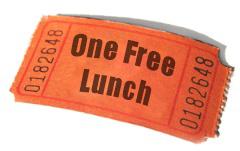Reader Mark asks a beginner’s question that might not be such a beginner question after all:
Hi Adam. This might seem like a silly beginner question, but what is the most important finance concept for a trader to know? I’m a college student taking finance and economics classes, and just wondered what you thought the most important thing for traders to think about is. Thank you!
Well, these “most important” questions are always a bit artificial, because the answer really is “you need it all.” If we’re building an airplane, do you want wings, an engine, a control stick, or cockpit windows? For a submarine, would you like to have a pressure hull, a powerplant, or dive planes? For a trading system, you want entries, exits, risk management, position sizing, or the discipline to apply those tools? So, I think we know at the beginning you kind of have to have everything, but maybe there’s value in knowing where to start.
 Ironically, I was speaking with (more “to”, but I always try to engage audiences lol) a group of students considering careers in finance last week, and we started discussing the basic principles of finance as they apply in the real world. What is that most important principle? Is it time value of money (i.e., a dollar today is worth more than a dollar tomorrow)? Is it the idea that investors should demand greater return for greater risk? Surely these are important, but I think the most important is that there’s no free lunch. Academically, we might say this is “no arbitrage [risk-free trading]”, or at least “very, very difficult and fleeting arbitrage that almost always goes away quickly.”
Ironically, I was speaking with (more “to”, but I always try to engage audiences lol) a group of students considering careers in finance last week, and we started discussing the basic principles of finance as they apply in the real world. What is that most important principle? Is it time value of money (i.e., a dollar today is worth more than a dollar tomorrow)? Is it the idea that investors should demand greater return for greater risk? Surely these are important, but I think the most important is that there’s no free lunch. Academically, we might say this is “no arbitrage [risk-free trading]”, or at least “very, very difficult and fleeting arbitrage that almost always goes away quickly.”
I think this is a good place for the developing trader to start, and it puts everything else in context. There’s no easy trading system that crushes the market. You can’t just buy based on simple indicator systems. You can’t do simple fundamental analysis, and find an edge. This principle also destroys simple seasonal analysis, and shows that there might be hidden dangers lurking in selling a boatload of option premium. Opportunity tends to be priced fairly in terms of risk, and if you think you’ve found an exceptional opportunity your first assumption should be that maybe you’ve missed a risk.
If you recalibrate your thinking to always challenge yourself and your assumptions, you will always be looking for those hidden risks. In full humility, know that there are times we will make mistakes and times we will simply miss things. There are risks we probably can’t understand until the event happens, but knowing those events lurk out in the tails will give you a deep respect for risk and a cynical outlook on much of the “analysis” that floods the media and blogosphere.
There’s no free lunch. If you think you’ve found one, you’re missing something or you made a mistake. Risk is the ever-present companion of opportunity, so much of your task becomes understanding those risks and taking the right risks into your trading book at the right time, and then managing them appropriately. Understanding that principle drives toward humility and respect, and also, by the way, begins to hint at where true trading edges may be found.
Thank You!